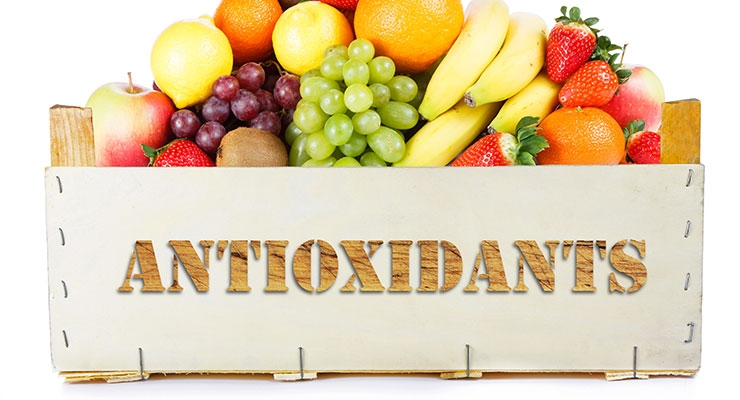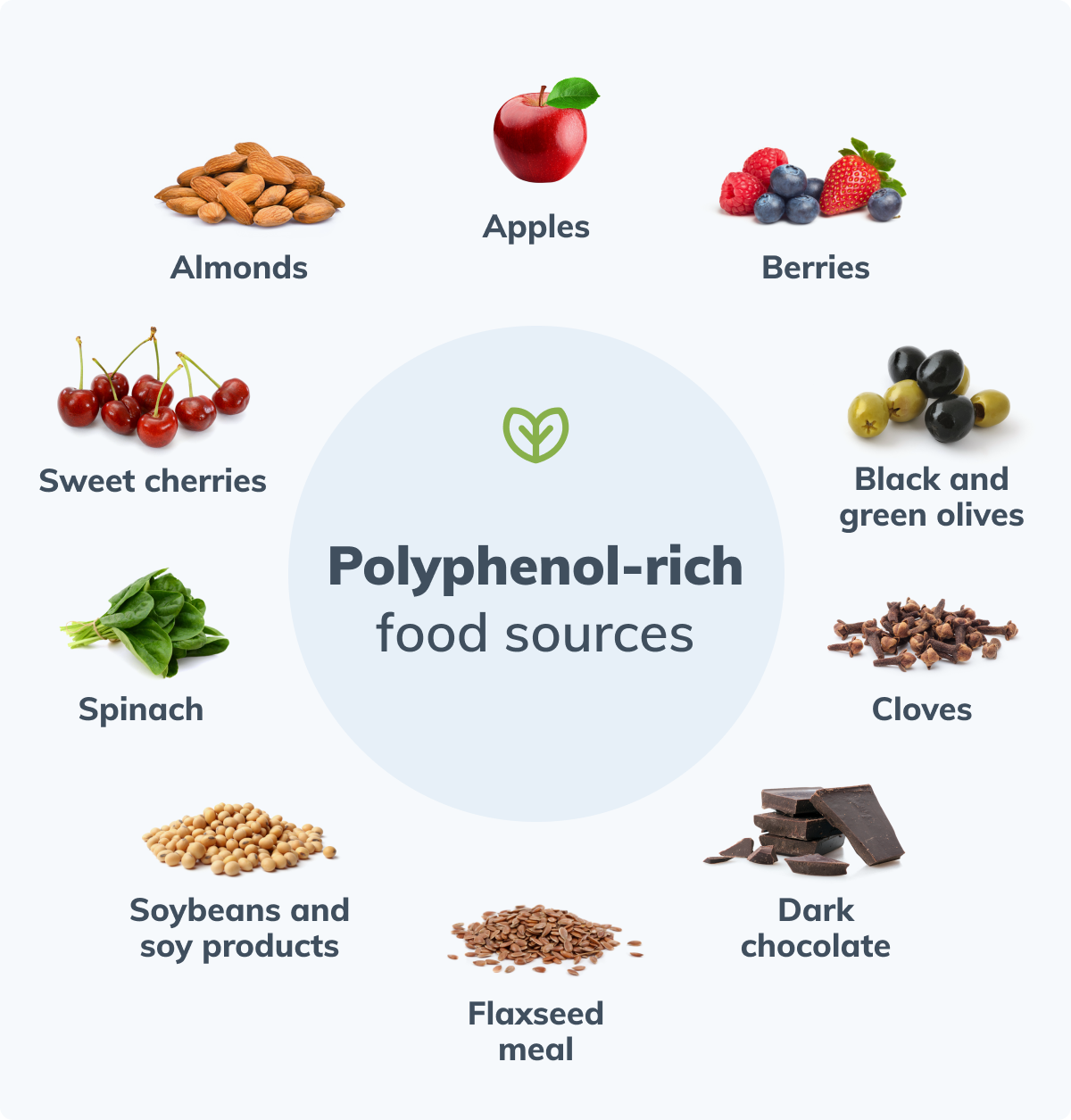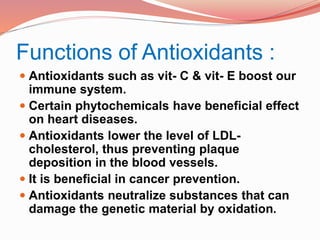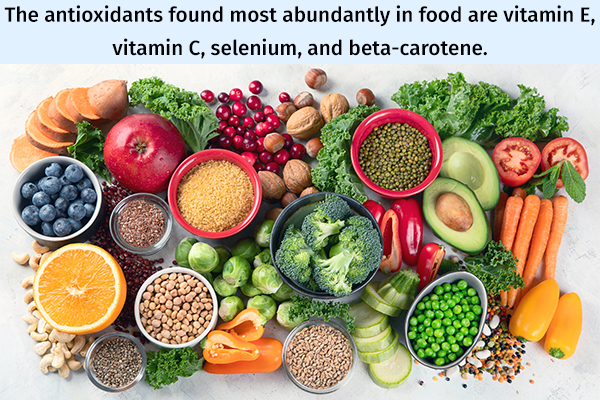Unraveling the Power of Antioxidants: How They Protect Your Health
In a world filled with environmental pollutants and stressors, our bodies face constant threats from harmful free radicals. Luckily, our defense system includes a group of superheroes called antioxidants. In this blog post, we will embark on a journey to discover the power of antioxidants and how they safeguard our health from the inside out.
Understanding Antioxidants
Antioxidants are substances that can prevent or slow down the damage caused by free radicals, unstable molecules that can harm our cells. These molecules are byproducts of various processes in the body, such as metabolism, as well as external factors like pollution, UV radiation, and cigarette smoke. When free radicals accumulate in the body, they can cause oxidative stress, which has been linked to chronic diseases like cancer, cardiovascular disease, and neurodegenerative disorders.
Exogenous antioxidants, which are derived from dietary sources, can complement the body's internal defense system. They include vitamins (such as vitamin C, vitamin E, and beta-carotene), minerals (such as selenium and zinc), and various phytochemicals found in plant-based foods.
Research suggests that a diverse range of antioxidants is necessary to provide comprehensive protection against oxidative stress. Different antioxidants work in different cellular compartments and have varying affinities for different types of free radicals. Therefore, consuming a variety of antioxidant-rich foods is crucial for obtaining the full spectrum of benefits.
Types of Antioxidants
There is a diverse range of antioxidants that work synergistically to combat free radicals. They can be broadly classified into three main categories: vitamins, minerals, and plant compounds.
Vitamins
Vitamin C (ascorbic acid): This water-soluble vitamin is a potent antioxidant that works in both the aqueous and lipid environments of the body. It helps regenerate vitamin E and enhances the activity of other antioxidants. Vitamin C also plays a vital role in collagen synthesis, immune function, and iron absorption. Good dietary sources include citrus fruits, strawberries, kiwi, bell peppers, and leafy greens.
Vitamin E (tocopherols and tocotrienols): As a fat-soluble vitamin, vitamin E primarily protects cell membranes from oxidative damage. It scavenges free radicals in lipid-rich environments, such as cell membranes and lipoproteins. Vitamin E also has anti-inflammatory properties and supports immune function. Good sources of vitamin E include almonds, sunflower seeds, spinach, and avocados.
Minerals
Selenium: This trace mineral is an essential component of several antioxidant enzymes, including glutathione peroxidase. It helps neutralize peroxides and protects cell membranes from oxidative damage. Selenium also plays a role in thyroid hormone metabolism and immune function. Good dietary sources include Brazil nuts, seafood (such as sardines and shrimp), whole grains, and eggs.
Zinc: Although primarily known for its role in immune function, zinc also acts as a cofactor for antioxidant enzymes, including superoxide dismutase. It helps protect against oxidative stress and supports various cellular processes. Zinc-rich foods include oysters, beef, poultry, pumpkin seeds, and legumes.
Plant Compounds
Carotenoids: These pigments are responsible for the vibrant colors in fruits and vegetables. They act as antioxidants and are known for their role in supporting eye health and reducing the risk of certain cancers. Some well-known carotenoids include beta-carotene (found in carrots, sweet potatoes, and leafy greens), lycopene (found in tomatoes and watermelon), and lutein and zeaxanthin (found in spinach, kale, and other leafy greens).
Each antioxidant has unique properties and mechanisms of action, which contribute to the overall antioxidant defense system in the body. By consuming a variety of antioxidant-rich foods, we can benefit from the synergistic effects of these compounds and enhance our protection against oxidative stress.
Health Benefits of Antioxidants
A. Protection against Chronic Diseases
Numerous studies have linked antioxidant-rich diets to a reduced risk of chronic diseases, including heart disease, certain cancers, and neurodegenerative disorders. Antioxidants combat oxidative stress, inflammation, and DNA damage, all of which contribute to the development of chronic conditions.
B. Immune System Support
Antioxidants play a vital role in supporting immune function. They help neutralize free radicals produced during immune responses and enhance the body's defense against pathogens. Adequate intake of antioxidants is essential for a well-functioning immune system.
C. Skin Health and Aging
Antioxidants contribute to vibrant, youthful skin by protecting against oxidative stress and reducing damage caused by UV radiation. They help maintain collagen production, promote skin elasticity, and prevent premature aging.
Food Sources of Antioxidants
A diverse and balanced diet is key to obtaining a wide array of antioxidants. Here are some examples of antioxidant-rich foods:
Fruits: Berries (blueberries, strawberries, raspberries), citrus fruits, grapes, pomegranates, and kiwi.
Vegetables: Spinach, kale, broccoli, bell peppers, tomatoes, and sweet potatoes.
Nuts and Seeds: Almonds, walnuts, flaxseeds, and chia seeds.
Whole Grains: Quinoa, brown rice, and oats.
Spices and Herbs: Turmeric, ginger, cinnamon, oregano, and cloves.
Lifestyle Tips for Maximizing Antioxidant Intake
To maximize your antioxidant intake and protect your health, consider the following tips:
Embrace a Rainbow Diet: Consume a variety of colorful fruits and vegetables to ensure a diverse range of antioxidants.
Opt for Whole Foods: Choose minimally processed foods over highly refined ones to retain the highest antioxidant content.
Cook with Care: Some cooking methods, such as steaming and stir-frying, can help preserve antioxidant levels in foods better than boiling or overcooking.
Mindful Supplementation: While a balanced diet should provide sufficient antioxidants, some individuals may benefit from targeted supplementation. Consult a healthcare professional before considering antioxidant supplements.
Antioxidant Supplements: Are They Necessary?
While a well-balanced diet is generally sufficient to obtain antioxidants, some individuals may have specific needs that can benefit from supplements.
Conclusion
Antioxidants are true heroes in the fight against cellular damage and chronic diseases. By incorporating antioxidant-rich foods into our diets and adopting a healthy lifestyle, we can optimize our antioxidant intake and enjoy the benefits of improved health and well-being. Remember, a balanced approach to nutrition, along with other healthy habits, can empower us to live vibrant and resilient lives.
















Comments
Post a Comment